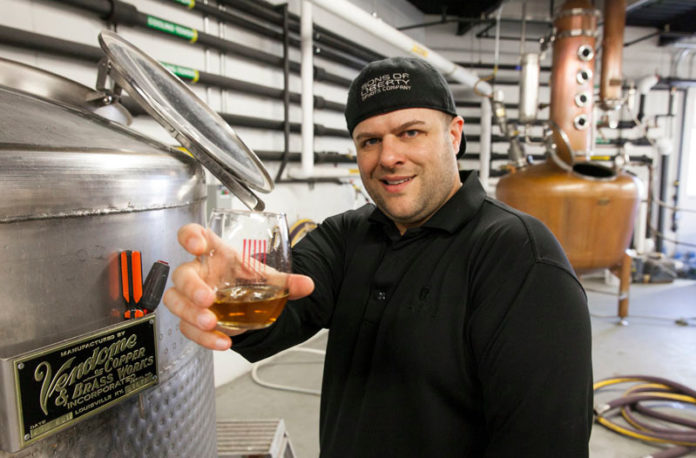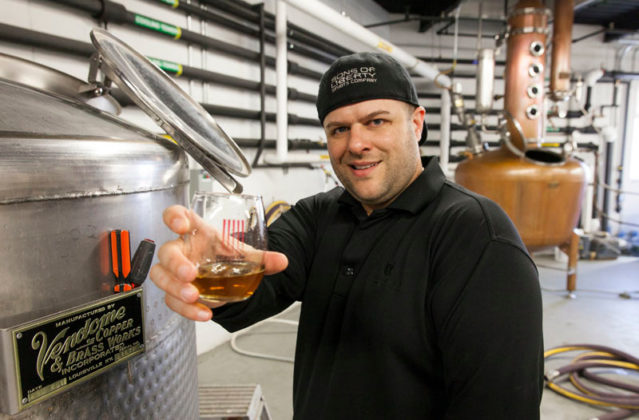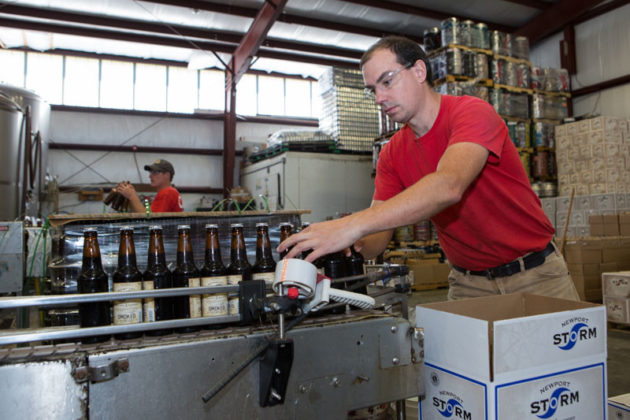
The ability to sell alcohol at his distillery has been a game-changer for Mike Reppucci, owner of South Kingstown-based Sons of Liberty Spirits Co.
It has boosted brand loyalty and “translated into bottles sold,” he said.
A bill signed into law on Sept. 9 allows the sale of up to 228 ounces of malt beverage and 750mL of spirits, in 72-ounce, or smaller, containers, per day, per person at Rhode Island breweries and distilleries for off-premises consumption.
In addition, the law allows for on-site consumption of up to 36 ounces of malt beverage and 4.5 ounces of distilled spirits per day, per person at the state’s breweries and distilleries.
Before the bill passed, Reppucci was critical of the limitation holding breweries and distilleries back from selling directly to the public, especially when so many of these venues hosted frequent crowds for tours and tastings.
“You see so many success stories and [the opportunity for expansion] in Massachusetts,” which is governed by more-lenient regulations dictating on-site purchasing at breweries and distilleries, he said.
Together with brewers such as Sean Larkin, owner of Revival Brewing Co. in Cranston, Reppucci and supporting legislators illustrated how changing the law, to allow on-site sales of alcohol directly to the customer, would help grow a Rhode Island industry that witnessed a growth spurt within the past five years.
Reppucci said the bill, which he advocated for, turned away from previous perspectives, when on-site sales were seen as endangering local restaurants and bars. The latter often feature local brews on tap.
“Historically people … were nervous of being cut out of the three-tier system,” where brewers sell to wholesale distributors, who sell to retailers and venues, who, eventually, sell to the consumer, he said.
Now, Reppucci says, the focus is on a growth opportunity for local brewers and distilleries. The bill was sponsored by Rep. Michael A. Morin, D-Woonsocket, and Sen. V. Susan Sosnowski, D-South Kingstown.
He could not share data on how the bill increased his business, but said the company’s tasting room has doubled in size, to 6,000 square feet, a “direct result” of the money generated from on-site sales.
Revival’s Larkin, who helped found the Rhode Island Brewers Guild, said the state should take the lead from brewing industries in Colorado where, for example, brewers can sell anywhere from a pint to a keg to on-site visitors.
“In New England all of our liquor laws were written post-Prohibition, when craft beer wasn’t front and center and wasn’t thought of as a small-business model,” he said.
Since the local debate regarding on-site sales began in 2014, Larkin said 10 breweries have opened in the state, including Whaler’s Brewing Co. in South Kingstown.
Owner Wesley Staschke said the bill “helped us grow, reinvest in the company, [and] expand… more freely.”
He estimated Whaler’s, which opened in 2014, witnessed 30 percent growth in on-site sales in the quarter after the legislation passed.
Reinvesting the revenue into the company will allow Whaler’s to move to a more prominent space, 10,000 square feet and with better parking, by December.
The idea to move wasn’t a result of the bill, but financial benefits of on-site sales “dramatically fast-tracked” those plans, said Staschke.
Staschke said on-site sales help the consumer to get to know the company, and the beer.
The new law, he added, gets Rhode Island “on par” with other states, though he believes its biggest impact will be bringing related businesses and suppliers to Rhode Island and developing an industry support network.
“As breweries grow, the need is going to increase and that will, in-turn, jump-start other types of businesses,” he said.
For Newport Storm Brewery, the oldest packaging brewery in Rhode Island, the story is different.
Since 1999, explained founder Brent Ryan, the business model has focused on selling to distributers – and that won’t change, even with the new bill. However, Newport Storm may hold more on-site events now, taking advantage of the on-site consumption allowance.
A member of the local brewers guild, Ryan said he’s seen incremental growth in his business, but believes the greatest benefit of the “pro-brewer” legislation is what it does for smaller players in the industry.
“It creates a path to existence [newer brewers] might not have had before. … They can continue to work on a smaller scale … while they hone their craft and raise money to turn into a full-scale production brewery business,” he said. •














